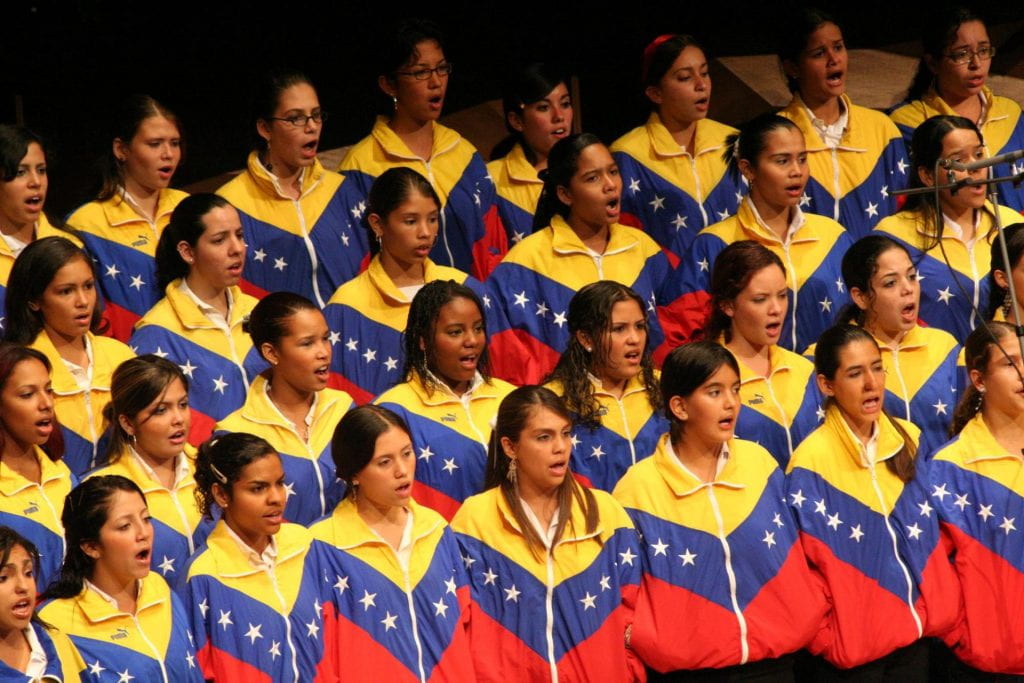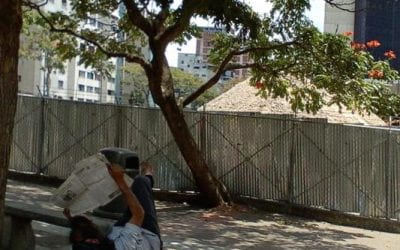The Power of Music
Venezuelan Seeds in Boston

Members of the Simón Bolívar Youth Orchestra sing the Venezuelan anthem. Photo courtesy of the Office of José Antonio Abreu
At the New England Conservatory of Music (NEC), I have had the wonderful opportunity to complete a concentration in Music-in-Education. During my first internship I worked on a research project that involved observations and surveys of children, teachers, and parents from two schools in Venezuela that place music at the core of their curriculum. The results were amazing; the participants reported overwhelmingly that the focused study of music had greatly improved the children’s concentration, their logic and problem-solving skills, their reading, language and math skills, their emotional intelligence and cultural understanding, and their interpersonal and intrapersonal abilities. Equally satisfying were the reports of how placing music at the center of the school culture enhanced the social life of the entire community.
We—speaking for myself and others who consider themselves disciples of Venezuela’s José Antonio Abreu—are prepared to assume our role as cultural entrepreneurs. That is, we are ready not only to write and perform music for audiences all over the world, but through the unique power of music, to play an important part in creating a better world for all of us to live in. We should not take this role lightly, nor think of it as mere rhetoric. I truly believe that we as teaching-artists have the responsibility of being the link not only between music and audiences, but between music and justice and the mutual respect that are essential in creating a peaceful society.
Several years ago, the United Nations established the Millennium Goals, an agenda for achieving worldwide social transformation during the 21st century. I feel that at least two of these goals—the achievement of universal primary education and global partnership for development—relate directly to our own mission as cultural entrepreneurs.
This past year we witnessed a marvelous example of global partnership. NEC not only invited the Simon Bolivar Youth Orchestra to play for and with the NEC community, but also held a seminar and symposium about El Sistema the astonishing 35-year-old Venezuelan music education program created by Abreu that has had an enormous impact in helping impoverished children and youth achieve a better life through the practice of music. The value of this unique system was recently acknowledged with the Principe de Asturias Award, which is granted to outstanding cultural projects throughout the world.
Last year, Abreu met in Boston with fifty music educators and cultural leaders from all over the United States, to talk about this program as a successful model for both individuals and communities, and discuss how this phenomenon could possibly be adapted in the far more affluent culture of the United States.
What the Seminar and Symposium participants noticed was that first and foremost, El Sistema features high-quality music instruction. Indeed, as Abreu suggests, when “music is no longer separated from daily life, but is in fact nourished by and nourishes all aspects of daily life,” then personal and social transformation become possible. El Sistema shows how the emotionally and intellectually positive environment of the orchestra system can help children apply the values that will make them complete human beings who can grow and progress as persons of high human and professional value, and who can thus take on significant roles in their communities and their country.
Moreover, very recently I read an article describing how the system has been extended to the prisons in Venezuela. This is a serious answer to the general lack of will to transform the prisons of our country into places where people can be rehabilitated through education. In the prisons where the system has been introduced, inmates not only learn a skill they can use once they are released, but also that they are human beings who have a high value in the community. This example alone indicates the potential universality of this idea.
Musicians can and must empower people in a positive way to know themselves better and to become eager to participate in making a better society.
Related Articles
Editor’s Letter: Venezuela
Long, long ago before I ever saw the skyscrapers of Caracas, long before I ever fished for cachama in Barinas with Pedro and Aída, long before I ever dreamed of ReVista, let alone an issue on Venezuela, I heard a song.
Elections and Political Power: Challenges for the Opposition
English + Español
Next month’s elections will be an important benchmark in Venezuelan politics. On November 23, voters will go to the polls to elect 22 state governors and 355 mayors in as many municipalities, as well as choose the mayor of Caracas. The elections are taking place in a political environment influenced by the abrupt proclamation of 26 laws on July 31, the last day of President Chávez’s 18-month powers to issue emergency decrees …
A Review of Tramas del mercado: imaginación económica, cultura pública y literatura en el Chile de fines del siglo veinte
Luis Cárcamo-Huechante’s new book provides us with a convincing counter-narrative, at once nuanced and succinct, to three mainstream narratives of the neoliberal free market in Chile: those of monetarist economics, promotional politics, and literary bestsellers. It covers the Pinochet dictatorship (1973-90) and the transition to democracy from its official inauguration in 1988, with the victory of the Yes vote for a return in two years’…




